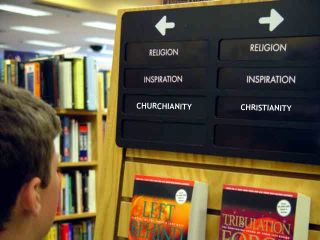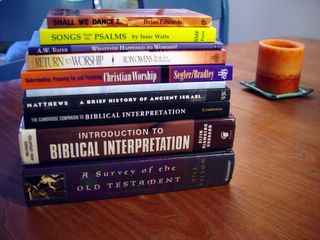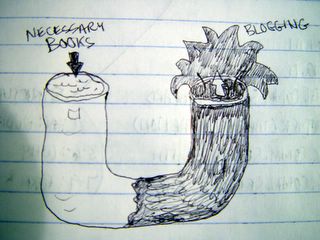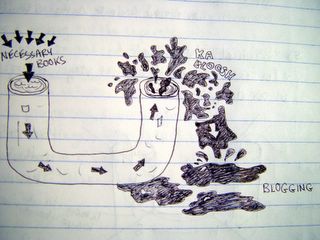
A puzzling-but-definite parting of the ways.
There is a form of church I love, and there is a form of church I despise.
One is countercultural. The other is culturally obsequious. One is centuries old. The other changes every few decades. One is Christ’s chosen context for changing lives. The other is the chosen climate of the status quo. Both are generally marginalized by the culture at large. One with good reason.
The aforesaid reason often results in an atmosphere that many mistake for the “Christian faith”:
Sipping Starbucks,™
muttered petitions
hit the carpet.
Is this a dull fraternity
or a rusty fire escape?
The form of church I despise makes Christ look like a feature in Consumer Digest, a product worth testing whose features are constantly becoming more convenient. Church-gatherings in such a context may assume the form of uber-hip “performances” or insipid religious bingo clubs, but they share a fundamental triteness. Repetitious chat about Jesus—with all the substance of an Atkins™ diet chip. The resulting conglomerate, sappy and hard to swallow, is what I loathingly call “Churchianity.”
The form of church I love is something more like a base camp in war time. That it has backbone goes without saying. But it mixes polemics and love in a most bewildering way. It doesn’t pull punches or mince words, and would rather die than put Christ in a gift box. This church is willing to die for you, but it stomps enthusiastically on the toes of your pet delusions. It laughs at death, cries over evil and says “to hell with social posturing.” This church looks a little like Christ.
All good and well. Until the moment comes for making distinctions, for applying labels and separating the sheep from the goats. Then one realizes that Churchianity and Christianity are often mixed and mangled together, frequently in the same location. And then what?
Suddenly Christ’s words on the topic make glaring sense. As he told his disciples, who were consumed at the moment with this very problem: This is my concern, not yours. You’re not the sorters, the arbiters of church-that-has-arrived. For now, showing artificiality the door is not your worry; just do your best to serve the church, even knowing it’s a mixed lot. (Matthew 13:24-30; 36-43 – my paraphrase/interpretation)
Today, this doesn’t mean I sign off on Churchianity, as though it’s some necessary evil, and therefore to be winked at. I realize, sadly, that in some sense, the Churchian “faith” will always be with us, inevitable as death and taxes. But that doesn’t mean I won’t skewer it when given the chance.
Seasoned Christianity, which so few see, takes a lot of hits from this saccharine imitation. All the more reason to critique it when possible, denigrating its triviality—which is, at any rate, readily apparent to anyone who takes a close look.
The goal, I think, is to snub the superficial Churchian subculture—which Jesus would have hated—while continuing to love the church, even those mired in clichéd, self-conscious mutations (Churchianity). As Tolkien wrote, "Not all who wander are lost," and this applies in the realm of true Christian spirituality no less than in the brutal Pelinor fields.
One perseveres in the mixed arena of "church," all the while hoping to find—and to sustain—ever increasing qualities of the real thing: That mysterious faith in Christ which is said to "overcome (not succumb to) the world"—and, surprisingly, with quiet steadiness, does.
Monday, February 14, 2005
Church Dichotomy
Posted by
AJ
at
1:30 PM
9
comments
![]()
Sunday, February 13, 2005
Stamina
Adam must have been a broken man
He lived 900 years
If he got up and tried again
I guess I also can.
Ever consider the dogged perseverance of Adam? Life after Eden surely had an aspect of monotony to it. Bitter self-recrimination would have been the path of least resistance. Considering how Adam fingered perfection, only to relinquish it on a whim, only to go on living for centuries, only to hope for a final repossession of what had been lost…prompts me to pursue endurance.
(See prior post for context.)
Posted by
AJ
at
4:21 PM
2
comments
![]()
Friday, February 11, 2005
The Tedious Life
%20049.jpg)
Monotony.
It’s a commodity that exists in such large quantities that the demand will never catch up. People have the impression that to encounter monotony is to be bored. Therefore no one wants it, and we have all these euphemisms for the same-old, same-old. Just the daily grind, you know, stuck in the waiting room, spinning your wheels. Just waiting for life to start.
Monotony has been the subject of many depressing songs. But it has its uses.
If nothing else, dull uniformity gives us a chance to work out the reality of our lives—our character, our faith—in the squeaky vacuum of unwinding time.
Like a symbols on a chalkboard, the “tedious life” as it appears is seldom overwhelming in its grandeur. It’s mere life-continuation. Squiggly white lines manage to break up the grey-green field, communicate a sketchy message, and not much more. Chalkboards have never been the preferred backdrop for astonishing revelations. However, they’ve often been the medium for rock-hard truths, unglamorous at the time, but irrefutably real.
As Socrates or someone once said, “The un-bromidic* life is not worth living.” Lackluster periods have a desired outcome, and Surprise!— that outcome is not disgruntled boredom. Rather, character is actuated, tested and proven in these down times. For those who know Christ, or claim to, the ante is upped: How real is your faith? How sincere is your pursuit of God? You won’t know till you collide with the massive inertia of sameness.
To utilize it—exploit it by continuing to be who you are—that’s the essential thing. You can’t afford to stand still and wait it out. No one has ever succeeded in “waiting out” monotony and remaining themselves. Strangely enough, continuing to be "who you are" in such a time is to actually become that person.
As Robert Browning wrote,
“I count life just a stuff
To try the soul’s strength on.”
Sameness is meant to sharpen inspiration, prove its reality in a kind of prolonged "clutch-time." Unfortunately, most people don’t make the proper use of their allotted dullness. Each of us is only given so much, and to waste it can be a costly mistake. We’re all destined for some dust. Whether we emerge reduced or deepened depends on one thing…
What kind of a person are you? To the (bored) horror of many, life-formation is the purpose of tedium.
This word appears in association with the Vocabulary Reclamation Project.
* Bromidic (“bro-mid-ick”). For some reason this word reminds me of that ominous phrase from Julius Caesar, “Beware the ides of March!” (Maybe it’s the consonance: that “B” in common—“Beware”/“Bromidic”—combined with the shared “id” syllable…) From this you might conclude, if you were paying attention earlier, that those Ides must have been a very tedious, wearisome, lackluster time. Which no doubt they were, until the moment of the assassination attempt. And there you have it. Not only have you just learned a new word, but you’ve acquired a little Shakespeare knowledge as well.
Posted by
AJ
at
10:35 PM
0
comments
![]()
Wednesday, February 09, 2005
The Year’s Best Book
We’ve all seen those “Book of the Year” lists, or at the very least the NY Time’s Top Ten. At first glance, the idea of compiling lists of books, pitting them against each other, and designating some as “best” seems to be a winner. And for the most part, it is. Even if the “top ten” were, by some freak accident, composed of pulp fiction, vitriolic ravings, and sentimental nonsense, there would arguably still be some value in the discussion such a list would provoke.
However, there are problems with standard “Book of the Year” lists, the most obvious being their chronological bias. I mean, c’mon! You’re telling me that every year, the “best book” just happens to be one that was published that year. Talk about a rush to judgment. Talk about societal self-importance.
We ought to have a level playing field, the only requirement for contestants being that they have been read within the given year. My winner will not be artificially bound by publication date. No chronological snobbery here. Simply the best book. Period.
Some of you may think it’s a little late to be choosing the “best of” from 2004. However, considering that the finest effects of good literature often appear long after consumption, a February ’05 release date makes perfect sense.*
So then. The initial field of contenders was about 40 deep. (For convenience’s sake, textbooks were not included in the initial reckoning.) Some quick weeding reduced the competition to an elite group of ten, listed alphabetically, not by probable level of greatness. (Note that—defiantly—not one of my finalists was actually published in 2004.)
Something Wicked This Way Comes – Ray Bradbury, © 1962
Brendan – Frederick Buechner, © 1987
The Great Divorce – C.S. Lewis, © 1946
Leap Over a Wall – Eugene Peterson, © 1997
Don’t Waste Your Life – John Piper, © 2003
Atlas Shrugged – Ayn Rand, © 1957
Whole Prayer – Walter Wangerin, © 1998
The Picture of Dorian Grey – Oscar Wilde, © 1854
The Jesus I Never Knew – Philip Yancey, © 1995
Recapture the Wonder – Ravi Zacharias, © 2003
As I surveyed my Top Ten, I realized the trap I was setting for myself. If I attempted to narrow the list down, degree by degree, book vs. book, until I had selected the “best” volume, I’d have to somehow outline my criteria, justify the elimination of the other nine, and write a very convincing explanation of why The Book was astonishing and life-changing.
I don’t have that kind of time.
Therefore, here is your winner. In five different categories.
Best Theology/Philosophy-Conveying Story
The Great Divorce – C.S. Lewis
Best “Classic” Bittersweet Novel
The Picture of Dorian Grey – Oscar Wilde
Best “Modern” Bittersweet Novel
Something Wicked This Way Comes – Ray Bradbury
Best Life-Formation
Recapture the Wonder – Ravi Zacharias
Best Applied Theology
The Jesus I Never Knew – Philip Yancey
Of course, you should just read them all. It goes without saying that each of the “top ten” have bittersweet, truth-inducing undertones to them, when read in the right light. The right light, of course, being Christ. Beyond that, you’ll have to take my word on their bestness, without further enumeration...at least for now.
So get reading.
* Although even this is somewhat rushed. Ideally, choosing 2004’s best book would be an ongoing process. It’s totally feasible that in ’06 I might realize that what I had thought was ‘04’s masterpiece was just a passing fancy…and a previous darkhorse had turned out to have real staying power. And then, Surprise! in 2008 I would examine 2004’s revised winner, and realize… You get the point.
Posted by
AJ
at
5:21 PM
7
comments
![]()
Self-Subversive Blogging
Sometimes I wonder if I'm starting to sound more like my blog.
Not that everything I say seems brilliant or remarkably funny (maybe that will be a long-term effect), but specifically, I wonder if I'm beginning to work more "useful" words into conversations, speak more directly and to the point. Could blogging affect speech patterns?
It could be just a matter of time until "transpicuous" or "wiggy" crops up in a conversation. Now that's a sobering thought.
Anyway, just something to think about (briefly) before getting back to life's more serious questions. Questions like, Could blogging affect one's coffee consumption?
Posted by
AJ
at
11:53 AM
1 comments
![]()
Tuesday, February 08, 2005
A Blogging Hurdle?
In Which I Consider My Chances of Survival
Above is a candid snapshot of this semester’s required texts.* “Required” in the sense of necessary/non-optional, rather than in the sense of “Yeah, right” (also understood by some as the “doorstop/paperweight” sense).
As expert students know, some textbooks are included in the syllabus merely to give below-average students a sense of accomplishment. The expert students realize that a) those particular textbooks merely duplicate the professor’s lectures, or b) those particular textbooks may be intellectually interesting, if you have time for them, but the professor has failed to tie them to the course (i.e. exams) in a really meaningful way.
Either realization generally leads expert students to “save that one for later,” which is another way of saying they will sell it at slashed rate to the first interested party.
For better or worse, my required texts this semester really are required. This could be a godsend or a disaster, depending on one’s perspective. I tend toward the godsend view, but with one caveat: What will this bookish barrage do to my blog-life?
Generally speaking, I’ve found that good (or “necessary”) reading tends to provoke good blogging. Using my vast Physics background, I’ve drawn a simple diagram below to illustrate this relationship.
The tube should be understood to represent the quasi-linear workings of my mind. The “necessary” books are inputted, percolating with other ideas and concepts until they emerge, reconstituted as brilliant blog posts. However, every closed system has elements that figure into an optimum working environment, and that’s where I’m concerned. What might happen if the quantity of necessary books expanded exponentially? Below is another diagram illustrating my darkest fears.
Will my required texts this semester exceed critical mass? If so, how could I compensate? Solutions would involve altered elements in the equation, say, a bigger “tube” (i.e. mind) or a new element…like coffee dosage.
Help me here, I’m reaching.
* Not included are this semester’s “auxiliary” textbooks, the pricey ones which you don’t actually read cover to cover, but have to keep on hand for reference. Kind of like life insurance, I guess. Anyway, were they present, this stack would be another eight inches high. But that would be misrepresentation.
Posted by
AJ
at
5:33 PM
7
comments
![]()
Monday, February 07, 2005
That Elusive Depth
Talk That Counts
I’ve often wondered what makes verbal communication gripping. How does a serious message, voiced in conversation, become Wow? How does one put truth in such a light that it appears as itself, irresistibly fine?
To go beyond—or rather beneath—mere recital, that’s the point. To subjugate words and truth so that you don’t merely repeat them, but have first claimed them, poured them inside so that they work themselves out with force.
As with a poem. You can read it off the page and lull your audience to sleep, or you can get it by heart and shock them into sight with your passion.
So many communications are like how-to manuals. No doubt they are helpful, probably even true, if one could ever make it past the table of contents. Sadly, they're “useful” and “forgettable” in the same breath—that’s the problem with verbal prescriptivism.
The key would be to first take and digest the contents yourself. Then you wouldn’t be pointing to topic headings like a tour guide, but recounting the gist of things, like a veteran. Spirited testimonials, not helpful references, are the idea.
In the long run, second-hand recitals tend to be forgotten. “Freshness”—which in the case of expressed truth is simply a nearer thrust at reality—comes only through prior ownership, through previous experience, love and taste.
In the case of conveyed truth, “Used” is the essential condition.
Posted by
AJ
at
8:21 PM
2
comments
![]()
The Agony of Defeat
After announcing this blog’s nomination in Evangelical Underground’s awards competition, it’s only right for me to fill you in on the thrilling outcome.
I lost.
Actually, BitterSweetLife didn’t even make the finalists list. As I see it, my blog was a little too underground for this competition. (Or, as an acquaintance of mine said after he’d been fired from his latest job, “I guess I was just too smooth for ‘em.”)
I can only hope that the humiliation of this Underground rejection will spur me on to greater endeavors.
Endeavors like…writing another real post.
Posted by
AJ
at
12:54 PM
4
comments
![]()
Saturday, February 05, 2005
Bittersweet Trump Card
An Expose of the Upbeat Perspective

"Optimism"...a mere shadow of the good life?
I've been thinking about this for awhile, and I'd like to publish a simple manifesto. In its most stripped down form, my declaration runs as follows:
Screw optimism.*
Now let me clarify. (Before you pause, then thoughtfully bookmark this page in your "amusingly angst-ridden" section.) This may sound like a strikingly depressing start to a dramatically jaded post, but that's not where I'm headed. So what exactly am I saying? That we should smash the rose-colored glasses, kick a hole in the positive think-tank, shatter that half-full coffee mug-I mean-glass? Well…it wouldn't hurt. But my problem with optimism isn't that it's happy but that it's artificial.
I'm all for happiness. In fact, to be happy is a fundamental purpose of life. As C.S. Lewis said, "It is a Christian duty for everyone to be as happy as he can." But what Lewis described was not optimism.
"Optimism," as I understand it, is "seeing the bright side," putting a "positive spin" on things, being “up.” But optimism offers no foundation for chronic upbeatness. It's like giving kids a bike with flat tires and saying "Go ride." Or like giving (MU) fans a team with flat coaches and saying "Go root." All optimists are doomed in the end, because there are some events in life that no amount of mental posturing can "positivize."
It's at these junctures that optimism appears as the dry well it really is. We all know that we ought to be happy, and most of us want to. When we're not, we sense something is wrong, and others look at us nervously and wish we would lighten up. But to say that optimism is an answer for pain is like saying There's got to be a way to spontaneously levitate, if I just think about it long enough. So, having resolved to drop optimism like a Martha Stewart stock tip, what's the alternative?
Looking back at some of my earliest posts, I realize this question—Where is the wellspring, the origin for authentic joy?—is one I continually grapple with. This elusive reality—the fundamental, radical nature of joy—was, in fact, the crucial ingredient in the creation of this blog. In one of my formative posts I said:
…I was trying to get an understanding of how my life could be so screwed up—and still there were these sudden moments of joy, lodged in my soul like glowing splinters. Why did they coexist?
Why indeed? Not because I had a “positive spirit.” Rather, because the bed-rock foundation of joy runs miles below shallow streams of “mindset,” eclipsing what I might feel at any given moment. Joy must rest on a higher reality than sentiment. Ultimately, we need, not a saccharine soul, but a happy God.
I sometimes wonder what a direct glance at Christ’s face—provided we survived it—would do to our vision of reality. I am not convinced that “one glimpse of his dear face, all sorrows would erase;” what I guess at is even more fantastic: sorrows not obliterated, but incorporated. Not erased, but realigned.
We would see the dance of the cosmos, of this shattered earth as ultimately triumphant, moved by a happiness that confronts tragedy and encompasses it. A joy that sweeps up life’s broken fragments and makes with them a mosaic, a stained-glass window, through which light shines. Perhaps the stains are the sorrows. I don’t know, but I suspect a glance in Christ’s eyes would give me a new read on suffering, an understanding that it somehow counted. That it did not negate happiness, but interlaced it. Like Paul of Tarsus wrote, “We are sorrowful but always rejoicing.”
But this use of sorrow, this recycling of pain, is only one outcome. We need more than a solution for suffering; we need a reason for joy. And we find it, in God himself, when we examine the edges of our lives more closely.
We all spend a number of years discovering that the world is not “a friendly place” after all. Then, if the journey of discovery continues, we find an even more impacting truth: Creation is.
Why? Because the happiest being in the universe is the One calling the shots. Therefore, the dance of time is ultimately joyful. The artistry of eternity is inevitably, finally, celebratory. Elated and worshipful.
We need a happy God like kids need a happy dad—and we have Him. God's joyful heart hems in, defines, the universe. As Jesus said, “These things I have spoken to you, that my joy may be in you, and that your joy may be full” (John 15:11). Later, one of his disciples would echo, “I am filled with comfort; I am overflowing with joy in all our affliction” (2 Corinthians 7:4).
Christ brings unshakeable joy.
We need, not optimism, but death-defying happiness. Joy comes to us, not through knuckle-whitening resolve to be up, but through infinite satisfaction in an endlessly perfect relationship. And this relationship waits nearby. Christ, who laughed with his disciples in the shadow of the cross, still walks with us today.
To sum up then, Life in Christ is pure joy. Life on earth is pain. Therefore, life is bittersweet.
For now.
* A perceptive reader (i.e. the type who make return visits to this blog) would have noted that “Screw optimism” is actually a completely inadequate and even misleading summary of my Joy “manifesto.” You’re absolutely right; it only conveys the negative, combative side of my statement. But it did get your attention, right?
Posted by
AJ
at
1:49 PM
5
comments
![]()
Thursday, February 03, 2005
Change of Fortune
Without warning, the sky brightens. Soothing aromas—as of flowers and Tahitian vanilla and strong coffee—breeze through the air. In a million homes and cubicles there is a sudden lessening of tension, as if someone has heaved a gigantic, barometer-dropping sigh.
Something has changed for the better. And up ahead, a figure advances, its silhouette growing more and more distinct. It looks solid, muscular—cut, in fact. The fog lifts briefly, and in a brilliant patch of sunlight, unmistakably—there it is!
Confident and powerful, A Post of Substance approaches. It appears to be moving fast.
Posted by
AJ
at
4:01 PM
2
comments
![]()










9 comments:
Post a Comment